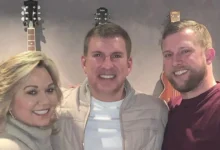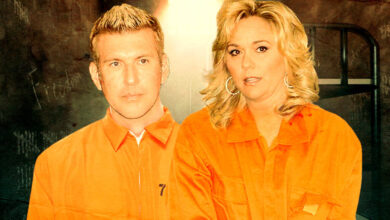Chrisley’s prison confession: A White man finally says what Black America’s know
In a world where wealth and fame are often seen as a shield from accountability, few stories are as polarizing as that of Todd Chrisley. Once the face of Southern charm and financial success on Chrisley Knows Best, Todd is now serving time in federal prison for bank fraud and tax evasion. But beyond the headlines of his downfall lies a confession that has struck a chord in ways no one expected.
Todd Chrisley’s recent reflections from prison—a raw, unvarnished glimpse into the inequities of the American justice system—are a stark departure from the glossy image he cultivated on television. In an emotional letter leaked from inside his cell, Chrisley wrote about the “harsh realities of incarceration,” calling out systemic issues like racial bias, economic disparity, and the dehumanizing conditions of the prison industrial complex.
For many in Black America, his words weren’t shocking—they were familiar.
The Awakening of Privilege
In his letter, Chrisley confessed to his ignorance of how the justice system disproportionately affects marginalized communities. “I thought I understood,” he wrote. “But until you’re stripped of everything—your name, your freedom, your humanity—you don’t really understand.”
He described witnessing Black and brown inmates being treated more harshly than their white counterparts, even for similar offenses. He noted the despair of those who couldn’t afford competent legal representation, contrasting it with his own high-powered legal team that, while unsuccessful in keeping him out of prison, still afforded him privileges most could never dream of.
For many Black Americans, this acknowledgment felt like a long-overdue validation of truths they’ve been voicing for decades. The justice system, they’ve argued, isn’t broken—it’s functioning exactly as it was designed, prioritizing the powerful while punishing the powerless.
Why It Matters
So, why does it matter that Todd Chrisley—a wealthy, white reality TV star—has had this epiphany?
Because privilege often acts as a buffer, insulating people like Chrisley from the harsh realities of systemic oppression. It’s easy to ignore something that doesn’t directly affect you. But when someone from that bubble steps forward to confirm what has been dismissed, downplayed, or outright ignored, it forces a different audience to pay attention.
Chrisley’s confession isn’t groundbreaking in its substance. Activists and scholars have long highlighted the racial and economic disparities in sentencing, incarceration, and prison conditions. But his platform—coupled with his newfound vulnerability—brings a fresh spotlight to the issue.
The Irony of Timing
The irony of Chrisley’s awakening isn’t lost on critics. Many are quick to point out that it took prison for him to see what Black America has known and lived for generations. It’s not that he’s the first person to voice these truths; it’s that his whiteness and celebrity give him a megaphone others have been denied.
This dynamic isn’t new. Throughout history, issues that have plagued Black and brown communities often gain traction only when white voices echo them. Chrisley’s reflections, while appreciated by some, also underscore the frustrating reality that lived experiences of marginalized people are too often dismissed until validated by someone with privilege.
From Words to Action
The question now is: What will Todd Chrisley do with this new perspective?
Acknowledgment is a start, but it’s not enough. Advocates for prison reform and racial justice are urging Chrisley to use his platform to advocate for meaningful change. Whether it’s highlighting unjust sentencing laws, supporting organizations like The Innocence Project, or amplifying the voices of incarcerated Black and brown people, he has an opportunity to turn his personal reckoning into a broader movement.
Some have even suggested that Chrisley’s confession could be the beginning of a “reverse pipeline” of awareness—where individuals who have experienced privilege, lost it, and gained a new perspective use their influence to bridge the gap between the insulated world they once inhabited and the harsh realities of the oppressed.
Black America’s Response: A Mix of Relief and Resignation
For Black Americans, Chrisley’s words are both a relief and a reminder. A relief that someone with his influence is shining a light on injustices they’ve long endured. A reminder that it took his own suffering for him to see what’s been in front of him all along.
As one commentator put it: “We don’t need more Todd Chrisleys to tell our stories. We need a system that listens to us without waiting for someone like him to co-sign.”
The Larger Conversation
Todd Chrisley’s confession is a microcosm of a larger conversation America needs to have about race, privilege, and justice. His words should not overshadow the voices of those who’ve been fighting for prison reform and racial equity for years. Instead, they should amplify those voices, adding momentum to a movement that’s far from over.
Because if there’s one thing Black America knows, it’s that the fight for justice isn’t just about acknowledgment—it’s about action. And while Chrisley’s confession might be a step in the right direction, the real work lies ahead.








